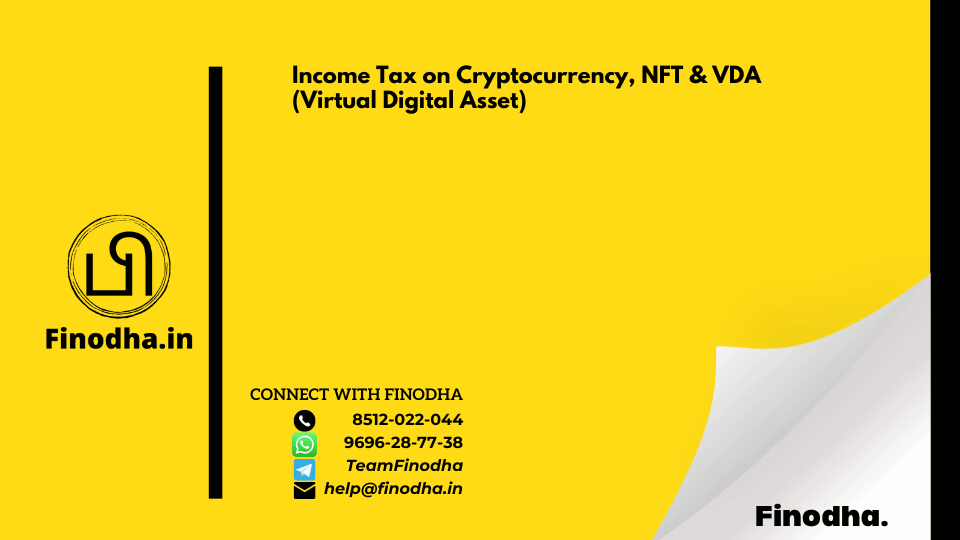Important Keyword: Cryptocurrency, Non-Fungible Token, Tax on Cryptocurrency, Tax on NFT, Tax on VDA, Virtual Digital Asset.
Table of Contents
Income Tax on Cryptocurrency, NFT & VDA (Virtual Digital Asset)
In the recent Budget 2022 announcement, Finance Minister Nirmala Sitharaman introduced significant changes in the taxation of cryptocurrency and other Virtual Digital Assets (VDA). Here’s a breakdown of the key highlights:
Section 115BBH: Taxation of VDA Income
- Flat Tax Rate: A new Section 115BBH has been introduced to levy tax on income generated from cryptocurrency and other VDAs at a flat rate of 30%. This provision will come into effect from 1st April 2022 onwards.
- Comprehensive Provisions: Section 115BBH encompasses provisions for taxing various aspects of VDA transactions, including transfers, gifting, treatment of expenses, and management of losses.
Section 194S: TDS on VDA Transfer
- Deduction of TDS: Another significant addition is the introduction of Section 194S, which mandates the deduction of Tax Deducted at Source (TDS) on the transfer of virtual digital assets. This provision aims to streamline the tax collection process and ensure compliance with tax regulations in VDA transactions.
Income Tax on Cryptocurrency and VDA under Section 115BBH of Income Tax Act
With the introduction of Section 115BBH in the Income Tax Act, the taxation landscape for virtual digital assets (VDAs) like cryptocurrency and NFTs has seen significant changes. Here’s a detailed overview of the key provisions:
Definition of VDA
- Inclusion: Virtual Digital Asset (VDA) encompasses cryptocurrency, Non-Fungible Tokens (NFTs), and any other digital asset notified by the central government.
Section 115BBH: Taxation on VDA Transfer
- Flat Tax Rate: Taxpayers with income from VDA transfer are subject to a flat income tax rate of 30%.
- Deductions: While no expenses or allowances are allowed, taxpayers can deduct the cost of acquisition (purchase price) from the income.
- Loss Treatment: Loss from VDA transfer cannot be set off against other income or carried forward to future years.
Taxation on Gift of VDA
- Taxable: Gift of cryptocurrency, NFT, or other VDA is taxable in the hands of the receiver.
Income Head for Crypto Tax
- Classification: There’s ambiguity regarding the appropriate income head for VDA transfer income.
Transfer of Crypto: Capital Gains or Income from Other Sources (IFOS)
- Capital Gains: Arguments favoring classification under Capital Gains include the inclusive definition of capital asset and the typical terminology used in Section 115BBH.
- IFOS: Some argue for classification under Income from Other Sources citing similarities with taxes on winning lottery, betting, and gambling, and the absence of specific inclusion of cryptocurrency in the definition of capital asset.
Tax Notices and Reporting
- Tax Notices: The Income Tax Department has initiated inquiries into previous years’ crypto trading income not reported in Income Tax Returns (ITRs).
Calculation of Capital Gain Tax on Cryptocurrency Transfer
- Formula: Capital Gain = Selling Price – Purchase Price
- Limitations: Taxpayers cannot claim transfer expenses, cost of improvement, indexation benefit, or capital gain exemptions.
- Taxpayer cannot claim deduction under chapter VI-A on such income
| Particulars | Amount | |
| Full Value of Consideration | XXXX | |
| Less | Cost of Acquisition | (XXXX) |
| LTCG / STCG | XXXX |
Tax on Cryptocurrency – Treatment of Loss from transfer
When it comes to the treatment of losses and tax deducted at source (TDS) on the transfer of virtual digital assets (VDAs) like cryptocurrency and NFTs, certain restrictions apply:
Loss Treatment:
- No Set Off Between VDAs: Loss from the transfer of one VDA cannot be set off against profit from another VDA.
- No Set Off Against Other Income: Loss from VDA transfer cannot be set off against any other income.
- No Carry Forward: Loss on VDA transfer cannot be carried forward to future years.
- No Set Off Across Income Heads: Loss from VDA transfer cannot be set off against profit from any other head of income.
TDS on VDA Transfer:
Section 194S mandates TDS at a rate of 1% on the transfer of VDA if the aggregate transfer amount exceeds INR 10,000 during the financial year, or INR 50,000 in the case of specified persons.
Income Tax Notice for Crypto Traders
The Income Tax Department has been actively sending notices to taxpayers who failed to report their crypto trading in previous years’ Income Tax Returns (ITRs). These notices, issued under Section 148A of the Income Tax Act, provide an opportunity for taxpayers to explain any discrepancies in reporting.
Notice Details:
- Inquiry Notice: The notice aims to conduct an inquiry before issuing a notice for income escapement under Section 148.
- Data Source: The department gathers data from crypto exchanges using PAN, Aadhaar, or linked bank accounts provided during e-KYC.
Responding to the Notice:
- Stipulated Time: Taxpayers must respond within the specified timeframe.
- Response Methods: Responses can be submitted via email or through the e-proceedings option on the income tax website.
- Justification and Proofs: Taxpayers should provide a detailed explanation supported by relevant documents to address the concerns raised in the notice.
GST on Cryptocurrency, NFT, VDA
Budget 2022 introduced income tax provisions for cryptocurrency, non-fungible tokens (NFTs), and virtual digital assets (VDAs). However, clarity on the applicability of Goods and Services Tax (GST) on these assets is still pending.
Interpretation and Analysis:
- Classification as Goods: Our interpretation of the GST Act suggests that virtual digital assets fall under the definition of goods. Consequently, the sale of cryptocurrencies and other digital assets should be subject to GST.
- Taxability of Services: Additionally, services provided by crypto exchanges are likely to be taxable under GST regulations.
Awaited Clarification:
Despite our interpretation, a formal clarification from the GST Council regarding the GST applicability on cryptocurrency and digital assets is eagerly awaited.
Read More: Income Tax Notice for Crypto Trading under Section 148
Web Stories: Income Tax Notice for Crypto Trading under Section 148
Official Income Tax Return filing website: https://incometaxindia.gov.in/





0 Comments